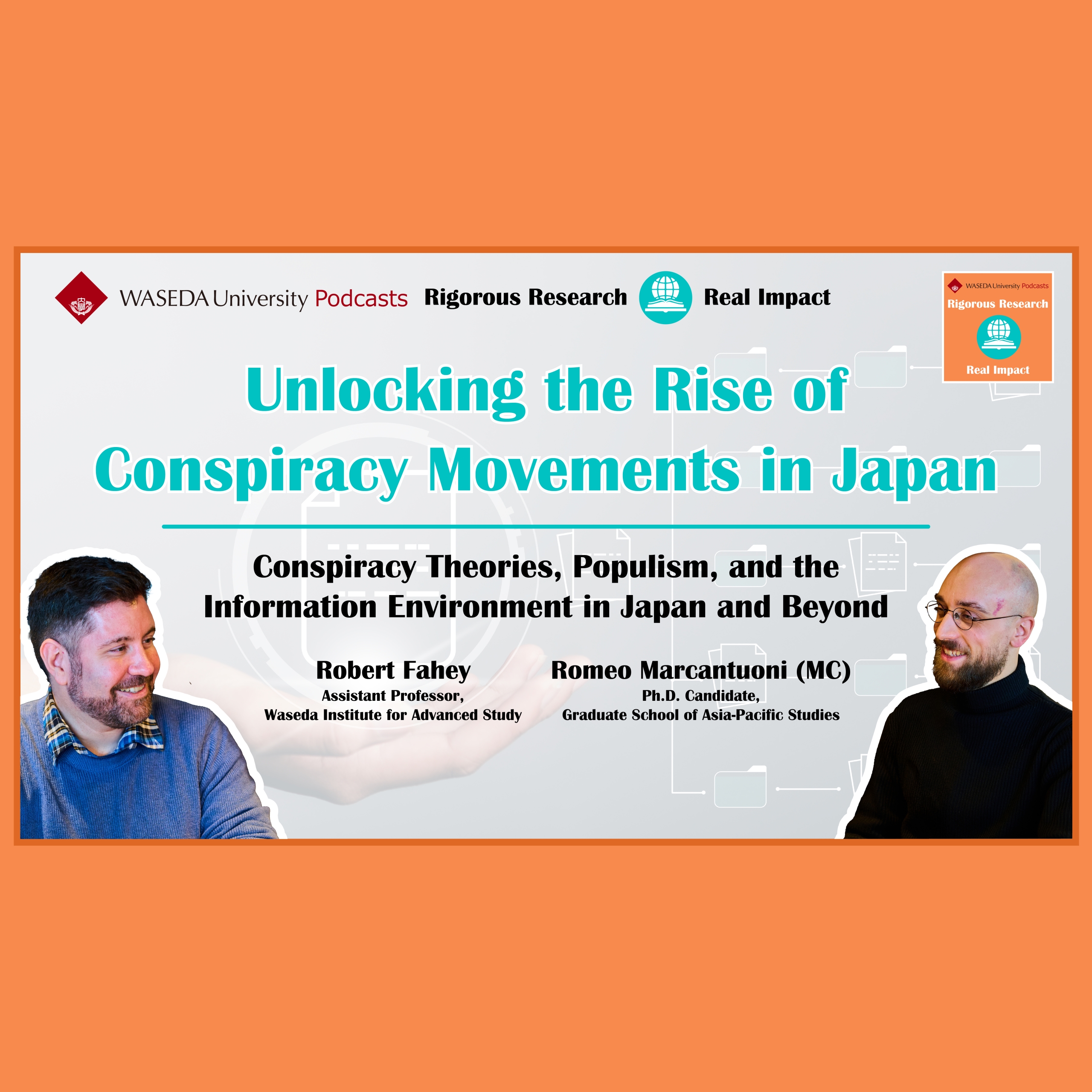[Podcast Column] Who Are Sanseito and Why Are They Thriving?
Wed, Jul 23, 2025-
Tags
The first 8-episode series of Waseda University’s English podcast “Rigorous Research, Real Impact” is currently streaming for free on Spotify, Amazon Music, Apple Podcasts, and YouTube.
In this column for the first series of the English podcast, we share an excerpt from episode 8 “Unlocking the Rise of Conspiracy Movements in Japan” featuring Dr. Robert Fahey as the guest and Graduate School of Asia-Pacific Studies Ph.D. candidate Romeo Marcantuoni as the MC. Marcantuoni asks Dr. Fahey to describe the niche political party Sanseito and explain potential reasons for why it is thriving.
*This episode was first released in February of 2025.
MC Marcantuoni (16:19): Could you walk us through what Sanseito is and the specific conditions that allowed it to thrive in Japan’s political system?
Dr. Fahey (16:41):
So yeah, Sanseito was the topic of the presentation we gave at ECPR (European Consortium for Political Research) last summer. This is a party that emerged during the pandemic. They really kind of emerged from the anti-vaccine and anti-masking movements that you saw in Japan during the pandemic. And to that extent, I think when they first emerged, people expected that they would just be a flash in the pan and as soon as those things were no longer a major salient issue, they’d just go away.
This is a country where little niche parties boil up and disappear very, very quickly. But instead Sanseito have kind of gone from strength to strength, not to the extent of being a major party yet, but they won a single seat in the Upper House. Then they won about 100 seats in local elections the following year. And in the general election last year they won three seats in the Lower House. So, they’ve really kind of continued to go from strength to strength even as the core issue that they were founded on, which was rejection of vaccines, has dissipated. And we’ve looked into their worldviews and their conspiracy beliefs, and it really still has that vaccination aspect at the heart of it. And it’s public health or rejection of public health measures. But they also now have a much broader conspiracy worldview that they peddled to their membership.
So that’s who Sanseito are in terms of why they have thrived. Why they have thrived in this political system. That’s sort of the puzzle because there are a number of countries where you had parties a little bit like Sanseito. So, you can think of something like dieBasis in Germany was a party that really resembled Sanseito when it emerged, but it just kind of fizzled off into nothingness. And you had similar kind of little conspiracy theory actors in a bunch of different places, especially in Europe.
If we look at Japan, there are a number of factors that I think have helped Sanseito to become successful, as well as their own agency. Right. They have also been a very good party in terms of organizing themselves and building themselves up into quite a significant force in terms of alternative media and in terms of messaging and in terms of presence in on-street campaigning, which is something a lot of parties really fail to do. The organizational stuff is very important. But in terms of Japan itself, Sanseito have really ridden the wave of a massive decline in trust in Japan. We’ve always thought of Japan as a high trust society and compared to Western societies, it pretty much is. But we have now seen a very big decline in media trust and Sanseito has been one of the beneficiaries of that. A lot of people feel that they don’t trust the mainstream media or that they don’t get the full story from the mainstream media. And unfortunately, who they turn to in order to get what they think of as the full story can be very unreliable sources.
Similarly, there’s a lack of faith in mainstream politics to produce solutions. I know we’ve both been working on Japanese politics for a long time, but even if you’re somebody who has just had casual conversations about it with people, it’s very hard to find a Japanese person who will tell you, “oh, yes, I think politicians are going to fix things.” I know that’s not a common sentiment in most countries, but certainly in Japan there’s a very, very low degree of faith that any political change or any election or any political movement is going to really fix things. And that of course opens the door to these kind of fringe actors.
The other thing is that Sanseito emerged at the time when there was a real vacuum in Japan’s right wing. So, this is after the assassination. I mean, they emerged before the assassination of Shinzo Abe, but they really came to prominence after that, where you have a vacuum on the right wing of the LDP. You have a sense from some right-wing people that the LDP has sort of been taken over by its centrists and its moderates. And so, there’s some people feeling a little bit politically homeless within that right-wing tendency.
And parties like Sanseito have also been able to capitalize on that kind of going down through the list here. But the other thing is the electoral system. It’s not a criticism of the electoral system, but Japan has a system of topping up seats through proportional representation. And that basically means that you can get into the Diet without necessarily directly winning a constituency seat. And Sanseito has never won a constituency. So, they’ve always got their seats through topping up in the local elections, where they also did reasonably well. They have a system in many places where you have say 50 seats in the local assembly and it’s a first past the post system. So, the most you’ll ever need to win of the vote to get a seat is 2%. So, this really lets small parties, niche parties, single issue candidates and so on get into those assemblies.
That’s not necessarily a bad thing. Some people prefer to have political systems that exclude small parties. Some people say that’s kind of like leaving a wound to fester. And they then get to go to their supporters and say, look how the system excludes us and oppresses us. So, there’s an argument for letting them into Parliament and exposing them to the light of day. But certainly, we do see that it’s in countries that have this more proportional electoral system that these types of parties have done reasonably well.
About the Guests:

Left: Dr. Fahey, Right: Marcantuoni
Dr. Robert Fahey
Dr. Robert A. Fahey was formerly an assistant professor of political science at the Waseda Institute for Advanced Study. His research interests include populism, polarisation, the effects of conspiracy theory belief, and Japanese politics. He is currently working on a series of large-scale surveys aimed at discovering what kinds of conspiracy beliefs are widespread in East Asian countries, and how those beliefs impact the political and social life of those nations.
Ph.D. Candidate Romeo Marcantuoni
Romeo Marcantuoni is a Ph.D. candidate at the Graduate School of Asia-Pacific Studies at Waseda University. He earned his MA and BA in Japanese Studies at KU Leuven, Belgium. His research centers on Japan’s progressive parties.


![[Podcast Column] Who Are Sanseito and Why Are They Thriving?](https://www.waseda.jp/top/en/assets/uploads/2025/07/Podcast-Column-8-full-quality.png)












